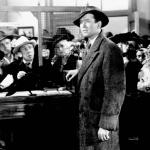In 2002, while X2: X-Men United was being filmed in Vancouver, I heard producer Ralph Winter speak at Regent College, and in the course of his presentation, he talked about some of the things that Christians had to be prepared to do if they wanted to work in the film business. For example, he said he had helped a guy make Shoot or Be Shot! (2002), starring Winter’s friend William Shatner, because the guy in question owned the rights to C.S. Lewis’s The Screwtape Letters, and Winter wanted to make a movie of it.
Now, reports Variety, it looks like Winter will get his chance:
Ralph Winter Prods. is producing a bigscreen adaptation of the C.S. Lewis novel “The Screwtape Letters” with Philip Anschutz‘s Walden Media.
Pic will be produced via Walden’s Bristol Bay Prods. banner (“Ray,” “Sahara“).
Pic, which Walden hopes to release in 2008, is the company’s second Lewis collaboration following “The Chronicles of Narnia: The Lion, the Witch and the Wardrobe,” which grossed $744 million worldwide. The sequel to that pic, “Prince Caspian,” is due out next year.
Like “Narnia,” “The Screwtape Letters” — which is described as a midbudget, primarily live-action pic — embodies Christian themes.
First published in 1942, “The Screwtape Letters” takes the form of a series of missives from a senior demon, Screwtape, to his wannabe diabolical nephew, Wormwood. As a mentor, Screwtape advises his protege on the finer points of undermining faith and promoting sin. His instructions are interspersed with observations on human nature and Christian doctrine.
Since taking over the publishing of “The Screwtape Letters” in 2001, HarperSanFrancisco has sold almost 1 million copies of the trade paperback alone.
Producing are Ralph Winter, Randy Argue and Lewis’ stepson Douglas Gresham. . . .
I have probably read The Screwtape Letters more often than any other book, outside of certain sections of the Bible, so I really don’t know how to begin reacting to this news.
A few questions, though:
While the book has a vaguely narrative shape, it is basically just a collection of letters, and not a novel or a drama, per se. So how do they propose to dramatize it? Is it even possible to dramatize this book while retaining its heavily theological flavour, its essence?
Will they keep the book’s World War II setting?
How will the demons be portrayed? Completely separate from the world in which the humans live, viewing it on monitors perhaps? Wandering around our world, invisible to all humans? Ghostly and transparent, kind of like the spirits in The Frighteners (1996)?
More importantly, will the demons be portrayed as bureaucrats or as the more stereotypically ghoulish creatures that one sees in horror films? In a later introduction that he wrote for this book, Lewis observed that religous art tends to portray angels with feathered wings and demons with membraned wings, but only because “most men like birds better than bats.” He added:
I like bats much better than bureaucrats. I live in the Managerial Age, in a world of “Admin.” The greatest evil is not now done in those sordid “dens of crime” that Dickens loved to paint. It is not done even in concentration camps or labour camps. In those we see its final result. But it is conceived and ordered (moved, seconded, carried and minuted) in clean, carpeted, warmed, and well-lighted offices, by quiet men with white collars and cut fingernails and smooth-shaven cheeks who do not need to raise their voice. Hence, naturally enough, my symbol for Hell is something like the bureaucracy of a police state or the offices of a thoroughly nasty business concern.
So will this film follow Lewis’s model? Or will it revert to the old membrane-winged, bat-like clichés? (FWIW, I have an old Marvel Comics adaptation that pretty much goes the latter route.)
Speaking of British bureaucrats and lampooners thereof, be sure and check out John Cleese’s audio-book version of The Screwtape Letters — if you can find a copy. It seems to be out of print.
Finally, The Screwtape Letters has come up a few times here before, usually in passing; the most notable occasion would have to be when I interviewed Scott Derrickson, and he talked about how The Screwtape Letters was one of the things that persuaded him that Christians could — and should — make horror films.












